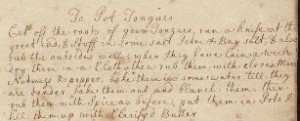We’ve been in touch with one of our most faithful DIY History transcribers, Roger. He didn’t intend to get so drawn into the project when he first visited our site, but now he admits that “things like eating and mowing get in the way but I’ve managed to blow off most other things cause I’m addicted to this.” Besides transcribing the manuscript pages, at which he has become expert, he likes to monitor the “Recent changes” log, which records all the work done by various contributors, and is accessible to anyone who creates a DIY History account. Like other frequent transcribers, he has an eerie sense of entering the private thoughts of writers long ago: “I keep thinking we’re almost invading something private these people from 200 years ago never expected anyone, but maybe a daughter or grand daughter would ever see their writings. It’s a great look into the “olden” times.” Roger has spent a lot of time transcribing recipes in the Szathmary Culinary Manuscripts and Cookbook collection, and has come across some really harrowing dishes, which make full use of body parts. He knows someone who worked at a meat locker for years, and even she “has no interest at all in the tongue, feet, head or any other questionable parts of meat, like udder. She hated to handle a tongue, no way is she going to eat it.” Ah, how times and palates change. Roger has found a way to multi-task his hobbies: “I use my 46 ” flat screen as my monitor so I can kick back in the lazy boy and start typing and deciphering. I finally decided Sunday I wasn’t able to watch TV and type at the same time and a Nascar race was on. So I did a bit of rearranging so I could watch on the older 27 ” TV while online and if something interesting came up I could jump back on the flat screen to see wrecks or whatever.”
Another of our best transcribers is British; his hobbies include deciphering Minoan Linear A and Mycenaean Linear B, gardening, and fine cooking. He has dedicated himself to transcribing and proofreading the Civil War Diaries and Letters, and sometimes reports to us his discoveries about old American slang and expressions, such as “wooden nutmegs and flannel sausages.”
We love to hear the transcribers’ stories, as they help us share the stories of these old manuscripts.
